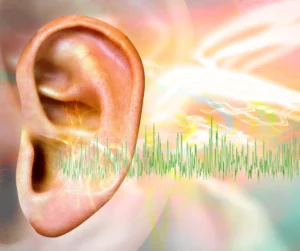Understanding Tinnitus: What Really Causes That Ringing in Your Ears?

Tinnitus is an auditory condition that impacts an estimated 50 million Americans. It involves perceiving sounds without an external source, and although commonly seen in older adults, it can affect people of all ages. Understanding what causes tinnitus is crucial for effective treatment and management. Various therapies and interventions can demonstrate what helps with tinnitus, improving the quality of life for those affected.
What Does Tinnitus Sound Like?
The primary symptom is the perception of phantom sounds, which can occur in one ear, both ears, or even within the head. These auditory sensations can vary in nature:
- Buzzing: A constant, low-pitched sound
- Hissing: Similar to the sound of escaping steam
- Whistling: A continuous high-pitched tone
- Roaring: A loud, overwhelming sound
- Clicking/Popping: Intermittent bursts of sound
- Whooshing: Resembles the sound of wind or flowing water
- Humming: A steady low or medium-pitched sound
- Musical Notes: Uncommon, but tonal sounds are possible
Tinnitus’ Impact on Daily Living
Tinnitus doesn’t only disrupt hearing but also affects other aspects of life:
- Sleep Disruptions: Trouble falling or staying asleep
- Focus Difficulties: Impaired concentration
- Emotional Struggles: Anxiety and depression
- General Discomfort: Irritability and annoyance
- Understanding these symptoms is the cornerstone for identifying and managing tinnitus effectively.
A comprehensive understanding of its root causes is essential to manage and treat tinnitus effectively. Factors triggering tinnitus include age, exposure to loud noises, and various underlying medical conditions. Further insights into the causes and possible treatments will follow.
Explore more about hearing protection.

Exploring What Causes Tinnitus: A Detailed Overview
Primary Causes of Tinnitus
Understanding what causes tinnitus is crucial for effective management. Here are the most common culprits:
- Noise Exposure: Often occurs in loud environments like concerts or industrial settings.
- Hearing Loss: Age-related or noise-induced, but not everyone with hearing loss develops tinnitus.
- Medications: NSAIDs, antibiotics, and antidepressants can sometimes cause tinnitus as a side effect.
- Ear Obstruction: Accumulated earwax or infections can lead to tinnitus.
- Head or Neck Injuries: Trauma can affect auditory pathways, resulting in tinnitus.
- Otosclerosis: Otosclerosis is a condition that causes the bones in the middle ear to harden. This can make it difficult for sound waves to reach the inner ear, leading to tinnitus and hearing loss.
Secondary Risk Factors
Less common but noteworthy causes include:
- Ménière’s Disease: Impacts balance and hearing, along with causing tinnitus.
- Jaw Issues: Conditions like teeth grinding can worsen tinnitus due to their proximity to the ear.
- Tumors: Vestibular schwannomas and other benign tumors can induce tinnitus.
- Vascular Conditions: High blood pressure or atherosclerosis can trigger tinnitus.
- Chronic Illnesses: Conditions like diabetes and autoimmune diseases are sometimes associated with tinnitus.
What Causes Tinnitus: Theories
The underlying mechanisms of tinnitus remain elusive, but several theories offer explanations. One prevalent notion posits that damage to inner ear hair cells could be a key factor. These hair cells transform sound waves into electrical signals sent to the brain. When damaged, they can transmit spontaneous, irregular signals, which the brain perceives as tinnitus. Another theory focuses on the central auditory system, the brain region responsible for processing sound. Any alteration or damage to this area could result in tinnitus. Some experts believe that a combination of factors, like noise exposure coupled with central auditory system damage, may contribute to what causes tinnitus. These theories provide valuable insights, guiding researchers and healthcare providers in managing tinnitus more effectively.
Read here to learn more about your hearing health.
What Helps With Tinnitus?
Effective tinnitus management usually requires a customized, multi-pronged approach, given the absence of a one-size-fits-all cure. Addressing any underlying medical issues can often relieve symptoms. Treatments may include earwax removal, medication adjustments, or surgical interventions for vascular problems. Hearing aids are also beneficial for those with age-related or noise-induced hearing loss.
When curing tinnitus isn’t feasible, noise suppression techniques offer relief. White noise machines and masking devices can be part of what helps with tinnitus. These gadgets generate sounds like rainfall or static, helping to distract from tinnitus during sleep or daily activities.
Therapeutic methods like Cognitive Behavioral Therapy (CBT) and Tinnitus Retraining Therapy (TRT) also prove useful. CBT helps modify your perception and emotional response to tinnitus, while TRT combines counseling with sound therapy for less noticeable symptoms.
Although no FDA-approved medications target tinnitus directly, some drugs can ease related conditions such as insomnia or anxiety. Alternative therapies like acupuncture and stress management techniques, such as mindfulness and biofeedback, are also available. While not universally proven, these options may offer relief for some individuals.
Lastly, hearing aids are often a critical component of tinnitus management, especially those designed for this purpose. We’ll examine the best options for tinnitus-specific hearing aids in the upcoming section.
Learn about Stanford Hearing Aids’ tinnitus treatment program.

Hearing Aids That Help With Tinnitus
Hearing aids serve a dual function in tinnitus management: they amplify external sounds and mask the condition, making it less intrusive. Consider several vital features to choose the best hearing aid for your needs.
Focus on sound processing; hearing aids with more channels closely mimic natural hearing. Automatic adjustments are essential for those experiencing persistent tinnitus, allowing the device to adapt to different sound settings. Customization plays a significant role; a hearing specialist can calibrate the instrument to your specific hearing loss and tinnitus frequencies. Finally, look for comprehensive in-person support, including device cleanings and adjustments.
Several brands excel in tinnitus management, considering these key features:
- Phonak: Known for high-quality sound, Phonak’s devices often employ advanced AI technology to adapt to diverse sound settings.
- ReSound: With robust tinnitus-masking features, ReSound’s offerings include integrated solutions or separate apps that play fractal tones to divert attention from tinnitus.
- Starkey: This brand offers a comprehensive app for tinnitus management, enabling personalized settings that target specific symptoms.
By weighing these factors and brands, you can make an informed decision that aligns with your lifestyle and tinnitus management needs. This preparation will also make consultations with your hearing specialist more productive.

Reach Out For Help
Understanding tinnitus requires a multi-faceted strategy, from identifying its causes to exploring treatment options. Turn to Stanford Hearing Aids for tailored care and top-notch hearing aids to alleviate tinnitus. Begin your journey toward improved well-being by setting up a consultation today. Contact Stanford Hearing today.
